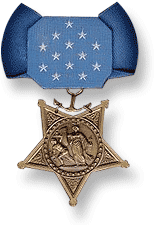Mervyn S. Bennion
| Mervyn Sharp Bennion | |
|---|---|
  | |
| Born |
May 5, 1887 Vernon, Utah |
| Died |
December 7, 1941 (aged 54) Pearl Harbor, Hawaii |
| Place of burial | Salt Lake City, Utah |
| Allegiance |
|
| Service/branch |
|
| Years of service | 1910-1941 |
| Rank |
|
| Commands held |
USS Bernadou (DD-153) Destroyer Division One USS West Virginia (BB-48) |
| Battles/wars | |
| Awards | Medal of Honor |
Mervyn Sharp Bennion (May 5, 1887 – December 7, 1941) was a captain in the United States Navy who died during the Japanese attack on Pearl Harbor. While mortally wounded, he remained in command of his ship — for "conspicuous devotion to duty, extraordinary courage, and complete disregard of his own life", he posthumously received the Medal of Honor.
Biography
Bennion was born in Vernon, Utah Territory on May 5, 1887. Bennion was a member of The Church of Jesus Christ of Latter-day Saints. His Welsh grandfather, John Bennion, had immigrated to Utah with the Mormon pioneers and established successful cattle operations near Taylorsville, Utah. Bennion was living near Preston, Idaho when he received his acceptance to the United States Naval Academy. Bennion graduated third in his 1910 class from the USNA. Coincidentally, his younger brother Howard Bennion, graduated first in his class of 1912 at the United States Military Academy.
His first assignment after graduation was on the USS California (ACR-6) in the engineering division.
Bennion became an ordnance and gunnery specialist serving in the Ordnance Bureau at Washington Naval Yard during World War I.
Bennion's first command was the destroyer USS Bernadou (DD-153), followed by command of Destroyer Division One. He assumed command of the USS West Virginia on July 2, 1941.
Captain Bennion was killed in action during the Japanese attack on Pearl Harbor, December 7, 1941, while in command of the battleship USS West Virginia (BB-48). Captain Bennion was hit by shrapnel from a bomb that blew up part of his command deck. Cook Third Class Doris Miller and several other sailors attempted to move Bennion to a first aid station, but Bennion refused to leave his post. Using one arm to hold his wounds closed, he bled to death while still commanding his crew.[1] Captain Bennion posthumously received the Medal of Honor. He is buried in the Salt Lake City Cemetery.
Captain Bennion was portrayed by Peter Firth in the 2001 film, Pearl Harbor.[2]
Medal of Honor citation
- For conspicuous devotion to duty, extraordinary courage, and complete disregard of his own life, above and beyond the call of duty, during the attack on the Fleet in Pearl Harbor, by Japanese forces on 7 December 1941. As Commanding Officer of the USS West Virginia, after being mortally wounded, Capt. Bennion evidenced apparent concern only in fighting and saving his ship, and strongly protested against being carried from the bridge.[upper-alpha 1]
Honors
On July 4, 1943, the destroyer USS Bennion (DD-662), named in his honor, was christened by his widow.
See also
References
Notes
- ↑ Despite his grave injuries, he continued at his post trying to manage the situation. He was posthumously awarded the Congressional Medal of Honor. His conduct is regularly cited in training as the epitome of proper command deportment under fire.[3]
Citations
- ↑ "USS West Virginia". United States Navy. Retrieved 2009-07-24.
- ↑ "IMDB," http://www.imdb.com/title/tt0213149/fullcredits#cast
- ↑ Mink, Michael (December 4, 2015). "Leaders & Success: Mervyn Bennion Stood Tall To The End At Pearl Harbor". Investor’s Business Daily. Retrieved December 4, 2015.
Sources
- Sherman L. Fleek, Saints of Valor: Mormon Medal of Honor Recipients, (Salt Lake City: Greg Kofford Books) 2013, chapter 2.
- This article incorporates text from the public domain Dictionary of American Naval Fighting Ships.
- "Mervyn S. Bennion". Claim to Fame: Medal of Honor recipients. Find a Grave. Retrieved February 22, 2010.
- "Bennion". Dictionary of American Naval Fighting Ships. Naval History & Heritage Command, Department of the Navy. Retrieved 2005-11-17.
- "Bennion, Mervyn Sharp". US People. Naval History & Heritage Command, Department of the Navy. Retrieved 2006-11-05.
- "Mervyn S. Bennion, Captain, USS West Virginia, 1941". USSWestVirginia.org. Retrieved 2007-07-31.
- "Biographical Sketch of Mervyn S. Bennion". USSWestVirginia.org. Retrieved 2008-04-18.
- "Bennion Family History". history.utah.gov. Retrieved 2007-03-08.